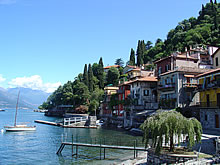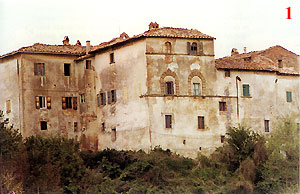This post is not going to a declaration of my undying love for Italy. No, instead it’s going to be about a problem situation which crops up all too regularly in the news here – that of public tender related corruption and fraud.
The situation which I’m going to examine is that of fiddles revolving around tenders for public works in Italy. No doubt the forthcoming 2015 Expo in Milan is causing certain individuals to rub their greedy little hands together rather gleefully at the prospect of ripping off millions from Italy’s taxpayers.
Indeed, stories of public tender scams are legion here, as I mentioned above. Keep reading to find out about the first time I came across evidence of shady dealings relating to building projects in the Living Museum, and to learn more about current and future tender scams.
Case One – Past
Up on the shores of lovely Lake Como there is a nice little spot which goes by the name of Varenna. I used to spend quite a bit of time up there with some wonderful people called Siobhan and Wayne Padgett, who have now moved back to Wayne’s home town of New York.

Now, Siobhan and Wayne lived in an apartment a stone’s throw away from Varenna’s little rail road station. This dwelling formed part of a cluster of similar two and three storey apartments. My friends’ flat, which had a lovely view of the lake and the surrounding mountains, suffered from a rear bedroom which was virtually inhabitable on account of rampant rising damp.
Being the curious type that I am, I asked why there was so much damp. I was told the damp was down to substandard building quality. Then I learnt that all of the apartments on this little development had been built with the ‘left-overs’ of the construction of the main road which ran alongside Lake Como on that side of the lake.
In other words, these houses were most probably the result of a tender fiddle. One of many.
Case Two – Present
Much more recently, indeed just after Christmas this year, there was an article in a local paper about another tender scam, which had been unearthed by an Italian magistrate of English origin, one John Woodcock, whose offices are down in Potenza. The enterprising investigative enterprises of Mr Woodcock had led to the uncovering of what looks to be some major irregularities in the construction of the new Milan local authority headquarters building up here in Milan. Accusations of corruption, fraud, false invoicing and manipulation of the public tender process have been emerging.
The HQ construction project is worth in the region of 185 million Euros; no small sum. And one of the people under investigation for his role in the alleged fiddles is a senior manager at Infrastrutture Lombarde S.p.A., a company which is owned by the Lombardy regional government which, in turn, is responsible for the development of infrastructure in the Lombardy region of Italy. This gentleman, one Antonio Giulio Rognoni, who was the new HQ building’s project manager, has hotly denied any involvement, but then he is hardly likely to come clean, now is he?
As to why a magistrate down in Potenza, which is way down in the south of Italy, has uncovered a scam up here in deepest darkest north Italy, is not all that clear from what I’ve read. It would appear that the first clues arose from investigations into the activities of a certain entrepreneur who was involved in trash trafficking. One lead led to another, and directed the investigators towards what appears to have been going on in Milan.
Easy Money
Well, fairly. Costing development projects is a complex job. To put it very simply, every single component needs to be assigned a price, and then totals need to be calculated. Labour prices are factored in, and provisions are made for contingencies – the cost of the unexpected. The tenderer will then decide on a profit margin. Once the project has been prepared, it is presented to the body who is ‘commissioning’ the works. Usually the tender process is a form of auction, or beauty parade, with the most attractive bid winning the right to carry out the required works.
There is potential for fraud at many points in the tender process. Costings can be adjusted upwards, profit margin can be increased, and contingencies can be rather more generous than perhaps they need to be. Last but by no means least, and something which appears to be common in Italy, those representing the bodies putting works out to tender can be got at. In Italy, where everybody seems to know everyone else, little arrangements can be reached whereby, and this is speculation, certain excessive costs are overlooked, or costings are simply not checked as thoroughly as they should be.

Stop reading, start speaking
Stop translating in your head and start speaking Italian for real with the only audio course that prompt you to speak.
With a 185 million Euro construction project like the Milan local authority HQ building , a 10% adjustment would leave an unscrupulous developer with a good few million Euros to temptingly flash around. And if someone wafts 2 million Euros under your nose for turning a blind eye here and there, then the temptation might prove hard to resist. Too hard it would appear in the case of the Milan HQ project.
More crafty Italian developers will cut costs by specifying one quality of material, cement for example, and then acquiring and using another quality, which can be sourced at a much lower price. Sub-standard components can keep costs down too.
Mini-Update: 5 May 2009: The results of such practices can been seen down in the earthquake struck region of Abruzzo, where the use of sub standard building materials led to buildings collapsing and killing people. Update end.
The Varenna situation, in which left over road building materials appear to have been used to construct a small residential development, was probably a case of the over specification of the amount of materials required, or collusion or both. What is clear is that some local authorities in Italy do not seem to bother using checking and balancing systems. Transparency is another thing which is sorely lacking. Then there is the promise of ‘contributions’ which can ensure that monitoring systems are sparingly applied or simply overlooked. How did that old Beatles song go? Ah yes, ‘With a little help from my friends’. Could be Italy’s national anthem!
Cases Three and Four – Future?
The arrival in Milan of the World Expo in 2015 will lead to a plethora of new building and refurbishment projects. The ‘Ndragata mafia bunch has already been sniffing around looking for ways to exploit this golden opportunity for making the odd million or three. The Milanese authorities are aware of this, but somehow money will be sucked away from public funds into the odd numbered bank accounts in Switzerland or another fiscal paradise. You can just about bank on this, if you’ll excuse the pun.
Then there is the proposal for the construction of a bridge connecting mainland Italy to Sicily. It’s not a bad idea, but many fear that building costs relating to this project will become incredibly high – mainly as a result of everyone taking cuts right left and centre. Then there is the question of whether the new bridge will be safe.
Building projects in Italy, such as the Sicilian bridge, seem to be prime sources of illicit income in Italy, and examples of inexplicable development litter the peninsular, from hotels in beauty spots, to apartments springing up on sea fronts and even whole housing estates, often without planning permission.
Past Beneficiaries?
Everyone in Italy wonders how Italy’s current Prime Minister managed to accumulate so much wealth so fast, but nobody has managed to find out how. And nobody probably ever will, now that time barring prevents investigations from taking place, and now that Berlusconi is surrounded by a top team of Lawyers cum members of the Italian parliament. One
thing is known though, one of Berlusconi‘s first money makers was, wait for it, a primarily residential construction project which led to the development of the Milano 2 area of Milan.
While Milano 2 was not publicly funded, it did require the support of local authorities to get it off the ground. One of the people which helped Berlusconi get his media empire off the ground was one Giacomo Properzj, who was to become mayor of the area in which Milano 2 was built. Properzj was also involved as an executive in Berlusconi companies, a few public services companies, such as Milan power provider Aem, and even the ATM public transportation company, not to mention his having held positions as president of the province of Milan.
You may draw your own conclusions from these positions and connections, which, of course, may well have been completely above board. That the lyrics of that Beatles song may well spring to your mind once more, would come as no surprise, though. As indeed will the fact that Berlusconi seems to be intent on introducing legislation ensuring that the interception of telephone conversations by law enforcement agencies is greatly reduced. Berlusconi’s enthusiasm in this matter is curious, is it not?
The Answer
The obvious solution, to me anyway, is to find a way of establishing who is friends with whom, as these friendships appear to lead to conflicts of interest, and eventual corruption. Then Italy’s law enforcement bodies need to be given much sharper teeth. At present though, Italy’s government is apparently striving to blunt such teeth, albeit the blunting process is being called ‘reform’.
More cases of tender fraud are pretty much inevitable in Italy, one suspects.




